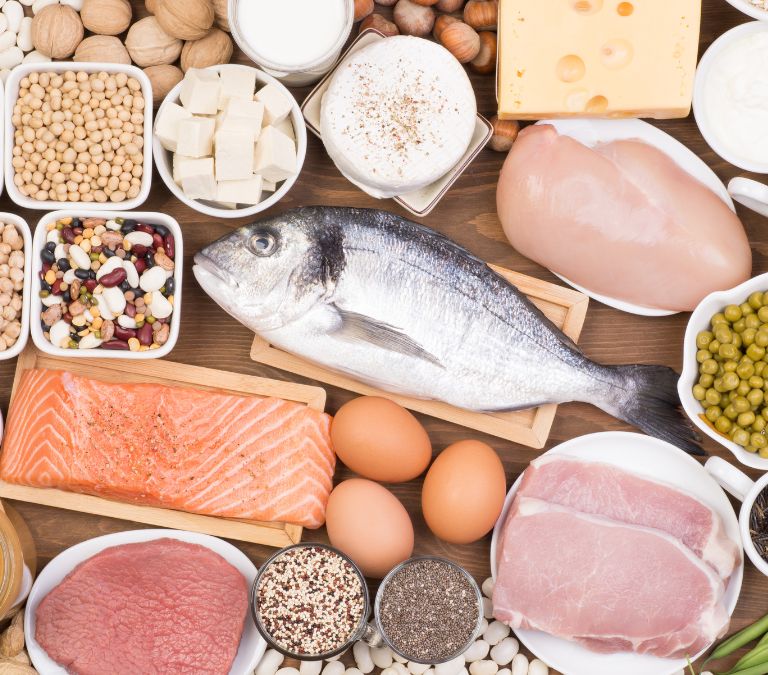As a woman’s menstrual cycles end, she enters menopause, a natural phase in her life. It’s confirmed when a year has passed since your last menstruation. Although menopause only lasts for a year, the transition and symptoms of menopause, on the other hand, can linger for several years.
While menopause is associated with unpleasant symptoms and an increased risk of certain diseases, your diet can help smooth the transition.
The hormone estrogen begins to drop during the transition to menopause and beyond, interrupting your regular cyclical rhythms of estrogen and progesterone; low estrogen levels harm your metabolism, contributing to weight gain.
In addition, these alterations may have an impact on your cholesterol levels as well as the way your body digests carbohydrates. As a result, many women encounter symptoms such as hot flashes and insomnia during this transition. Hormone fluctuations also cause a decrease in bone density, which increases the risk of fractures.
However, the fortunate thing is that with proper dieting and minor lifestyle changes, most of the symptoms of menopause can be kept in check. A healthy diet plays a vital role in the functionality of the body. Protein, especially, is a nutrient that everyone seems to be raving about.
It seems to play an essential part in all the major diets. But does protein help with menopause? How does it help, and what are the best protein sources for menopausal women? We are hoping to answer those questions for you with this article.
Is Protein Beneficial To Menopausal Women?
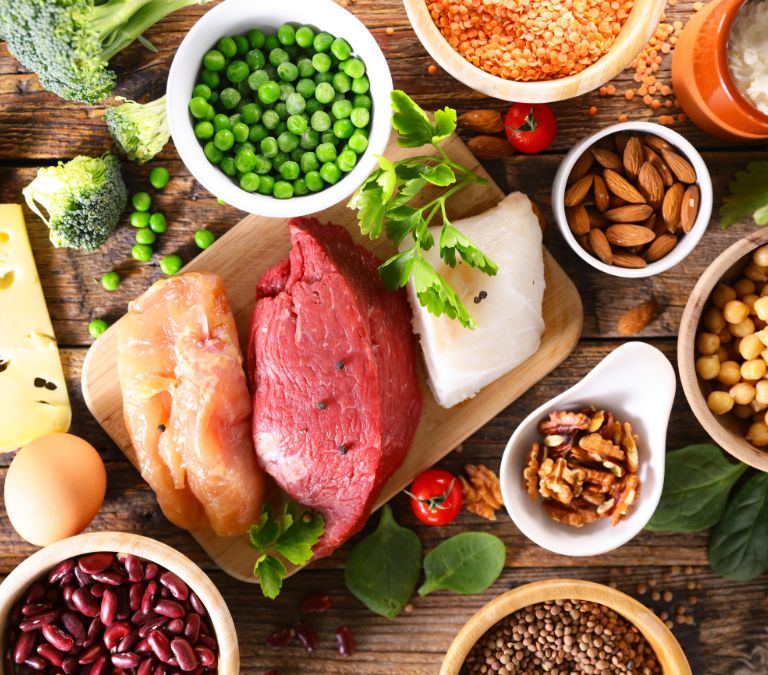
You have probably heard of essential nutrients. Protein is an important macronutrient, so you need to consume a quantity to function correctly. Protein is found in every cell and is referred to as a “building block.” It is responsible for the healing of tissues.
Protein becomes even more vital in the diet as you become older and enter menopause to boost your immune system, rebuild and strengthen muscles, and maintain skeletal stability.
Before we go into the benefits of protein to menopausal women, let us look at why protein is important for women generally. According to some research, eating more protein may postpone the onset of menopause, lowering your risk of getting cancer as you become older. Women who consumed more refined pasta and rice had natural menopause sooner.
In contrast, those who ate more fatty fish and fresh legumes experienced natural menopause later. It’s better to approach menopause later in life because you’ll benefit from estrogen’s protective effects for a longer length of time. Younger perimenopausal women must consume enough protein regularly. It would be better if they consumed the proper protein.
For menopausal women, protein plays an even more important role than it does for perimenopausal women. The onset of menopause is a process that must occur, and no matter how you try to postpone its arrival, menopause is inevitable. Menopause brings with it a decline in the level of the estrogen hormone.
This decrease has been linked to a decrease in muscle mass and the ability of bones to maintain their structure. When you consider that it is even more difficult for women to build up muscle, you would understand how disadvantageous it is for women to be losing muscle.
Benefits of Protein to Menopausal Women
We have mentioned the effects protein has on people, especially menopausal women. Let us now look at the roles protein plays in the health of menopausal women.
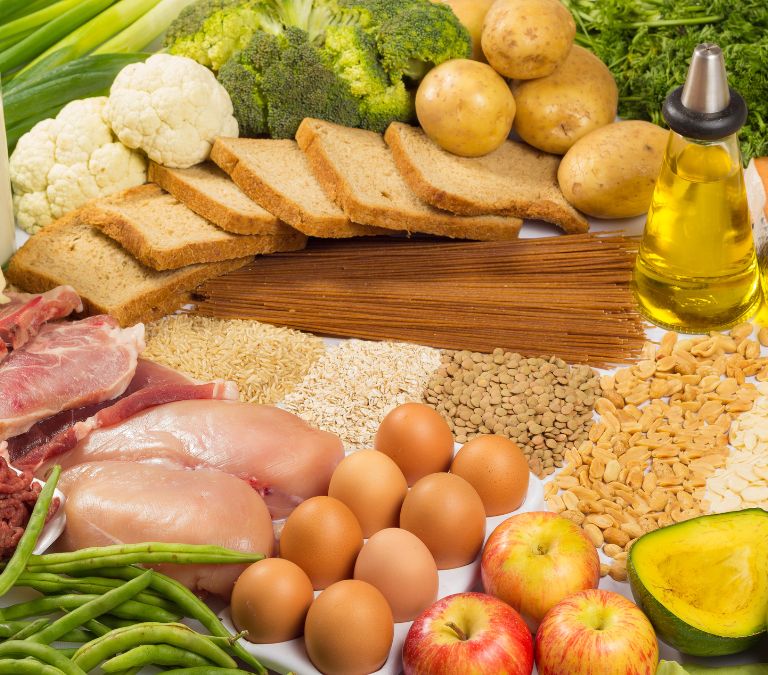
- An Essential Macronutrients
Protein is one of the three macronutrients. It is essential, and the body requires it in large quantities. Protein plays a major role, to name a few, in cellular growth, development and repair, defense, cell signaling, and hormonal health.
- Hormone Production
As unimportant as they may sound, hormones play an important role in maintaining our physical, emotional, and mental health. Their messenger duties ensure that your emotions, weight, mood, and even eating habits are controlled.
Women should understand the importance of hormones. After all, most of the symptoms they suffer are based on hormonal changes. And the major treatment for these symptoms is to restore the hormonal balance through hormone therapy.
Because of these hormonal changes’ effect on the body, we must maintain our balance. This importance becomes even more obvious for menopausal women. Fortunately, you can enhance your hormonal health and feel and perform better with a well-balanced diet and other healthy lifestyle choices.
One of the ways to do this is by consuming a good amount of protein. Consumption of a minimum of 30 grams of protein will go a long way in maintaining hormonal health and extending longevity.
- Prevention of Sarcopenia
Sarcopenia is defined as a degenerative depletion of lean muscle mass. It is usually associated with age and involves the loss of functionality and mobility of muscles. Therefore, Sarcopenia is synonymous with a reduced quality of life. Sarcopenia has been known to affect longevity, decreasing the average lifespan of menopausal women.
People usually start losing muscle mass when they get to 50 years old. And this could be for a lot of reasons, including chronic diseases, poor nutrition, and decreased activity levels. However, Menopause-related hormonal changes are one of the major motivations for older women.
The decline in fertility during perimenopause and menopause causes estrogen levels to drop, which has a domino effect on the rest of the body. According to research, the reduction of estrogen, which is vital for preserving muscle and bone structure, has been linked to Sarcopenia.
As a result, consuming enough protein to help prevent lean muscle loss is important for older women, especially those experiencing menopause. According to a new study, a high protein diet in middle and later life, particularly for older women, may be particularly beneficial in maintaining physical function.
- Aids In Weight Loss
Another effect that comes with menopause is weight gain. Women experiencing menopause tend to gain weight, especially around the stomach region. Because of the health impact of this weight gain, most menopausal women strive hard to lose it through diet and exercise.
The problem, however, comes up when you realize that losing this fat is also accompanied by the loss of lean muscle mass. While it is important to lose the accumulated fat, intense muscle loss can affect a woman’s balance and her ability to accomplish routine activities like going upstairs or getting out of a chair.
When an older woman is trying to reduce weight, a high protein diet can help to prevent muscle loss, preserving her muscle-to-fat ratio.
- Management of Osteoporosis
Osteoporosis is another condition that is linked to menopause. It is a disease characterized by low mineral density in the bones. This leaves the tissue extremely frail and prone to fractures. Osteoporosis is more common in older adults. It is significantly more common in women, where the development generally corresponds with menopause.
This condition presents a significant health challenge for the world because it almost always leads to long-term treatment. The decline in muscle and bone health is due to inadequate protein consumption. And because of how high the body’s demand for protein becomes as we age, the need to consume more protein becomes more and more obvious.
How Much Protein Should Menopausal Women Consume?
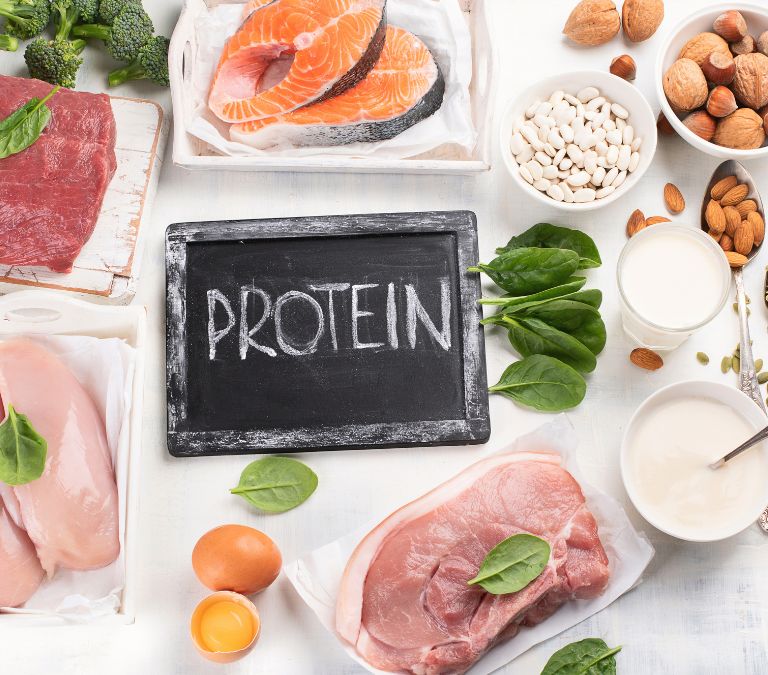
Now that we have decided that protein is important for us, let us look at the proper amount of protein that a menopausal woman should consume.
Adults should consume 0.8 grams of protein per kilogram of body weight, while highly active women should consume 1 to 1.2 grams. It translates to 54 to 68 grams of protein per day for a 150-pound woman.
Starting with breakfast, incorporating protein sources into your diet more balanced throughout the day is a great place to start. Many of us eat a lot of protein in the morning but don’t eat it again until supper.
It’s been proven that including high-quality protein in every meal, rather than simply once or twice a day, promotes muscle repair and growth. When it comes to increasing muscle mass, it’s especially vital not to scrimp on protein after a workout. You don’t have to be afraid of appearing like a bodybuilder because you train and eat protein.
A typical day’s protein intake might consist of 5 to 6 ounces (20-25 grams) of high-quality protein spread evenly throughout meals and snacks. The general agreement is that you need a good dose of protein at every meal. This is frequently where the menopause diet goes wrong because we are still primarily concerned with carbohydrates.
However, there is a limit to how much protein one may consume. Even after menopause, it’s extremely difficult to become protein deficient if you eat enough calories for your fitness level. Excess protein is often retained as fat (rather than muscle), resulting in weight increase and the excretion of any unneeded amino acids.
Other side effects of too much protein may include elevated cancer risk, especially in red meat-heavy diets, heart disease, and calcium loss. If you have renal disease, it’s especially crucial to keep track of your protein intake because too much protein can be taxing.
7 High Protein Foods Menopausal Women Should Eat To Relieve Menopause Symptoms
Now that we have decided that protein is good for the body, we have decided on the right amount of protein to consume. What are the best sources of this particular essential micronutrient? Many people believe that they are on the safe side because they believe they consume enough of the supposed proteinous meals, but this might not necessarily be the case.
A lot of people focus on animal-derived proteins. This is not a completely good thing because animal-derived proteins are always accompanied by cholesterol and saturated fats.
If you eat animal-derived proteins like meat, eggs, and dairy regularly, consider them as side dishes rather than forming a part of the main meal. Consider shifting your attention to oily fish and plant-based protein sources instead. Why are plants important?
Plant meals are high in fiber, antioxidants, vitamins, and minerals, excellent for aging and menopause. In addition, they lack the cholesterol and saturated fat found in animal products. As a result, plant-based diets help you lose weight and keep it off, and they’re also inexpensive if you’re on a budget. Furthermore, a lot of plant proteins are gluten-free.
Although animal-based proteins tend to be easily broken down compared to their plant-based counterparts, it would not do well to ignore the advantages, especially for menopausal women. Because when it comes to bone health during menopause, plant protein may be even more advantageous. A recent study of apparently healthy people found that eating dairy protein was connected to an 8% lower risk of hip fracture while eating plant protein was linked to a 12% lower risk.
So what are the food items that menopausal women should consume to maintain a healthy protein level without compromising other areas of their diet? In this article, we have curated a list of the best source of this macronutrient for women experiencing menopause. This list is not exhaustive, so ask a dietician or a healthcare provider for a complete list of dietary requirements and food options to explore.
- Salmon
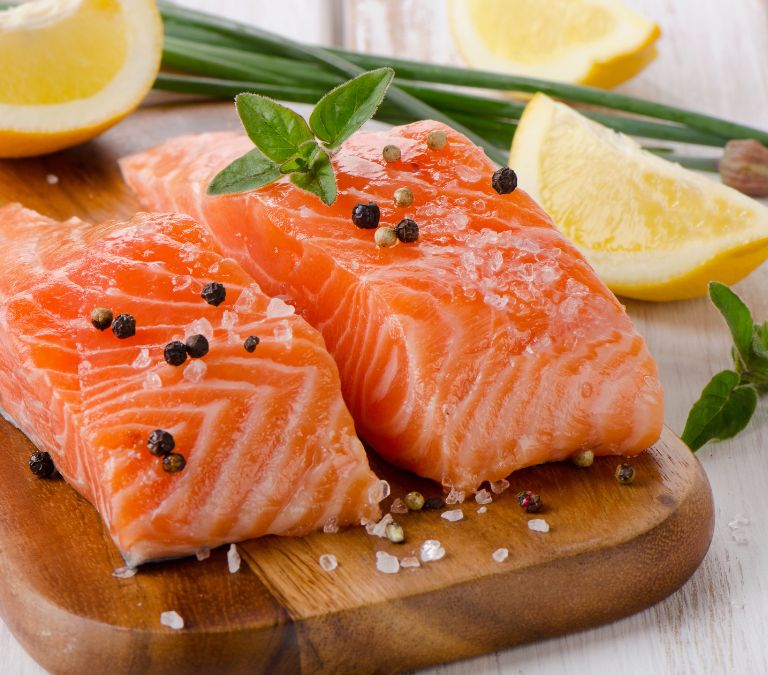
Salmon is a wonderful protein source. A 3-ounce (oz) filet has 23 g of protein, roughly one-third of your daily protein requirements.
Salmon is also particularly high in vitamin D and omega-3 fatty acids, which are important during menopause. While further research is needed, omega-3 fatty acids have been associated with reducing night sweats and the risk of breast cancer. According to one study, Omega 3s are also advantageous to women as they transition out of menopause.
Vitamin D is necessary for strong bones, cancer prevention, and the prevention of several other serious chronic diseases, all of which are influenced by menopause. Vitamin D is also linked to a lower risk of premature menopause. Vitamin B12 is found in salmon and other animal sources such as chicken and beef. It helps regulate serotonin and dopamine, two key neurotransmitters that affect how you feel.
- Eggs
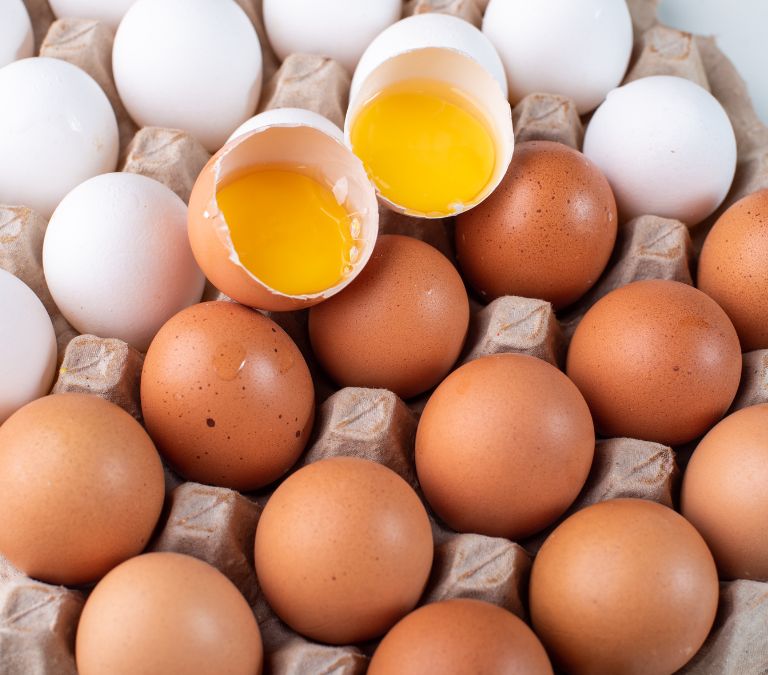
Menopausal women can also benefit from eggs as a source of protein. Eggs are high in vitamin D and iron, two minerals that many women need. In addition, eggs are a low-carbohydrate, low-calorie, and low-cost protein source. With only 70 calories, one egg contains 6 to 8 grams of protein. Eggs are a complete protein high in vital vitamins and minerals, making them extremely healthy.
Because of their cholesterol level, eggs have had a negative rep for a long time. However, we now know that the amount of dietary cholesterol in eggs has only a minor effect on serum cholesterol levels.
According to heart doctors, eggs should be limited to one per day or half a dozen per week.
- Dairy
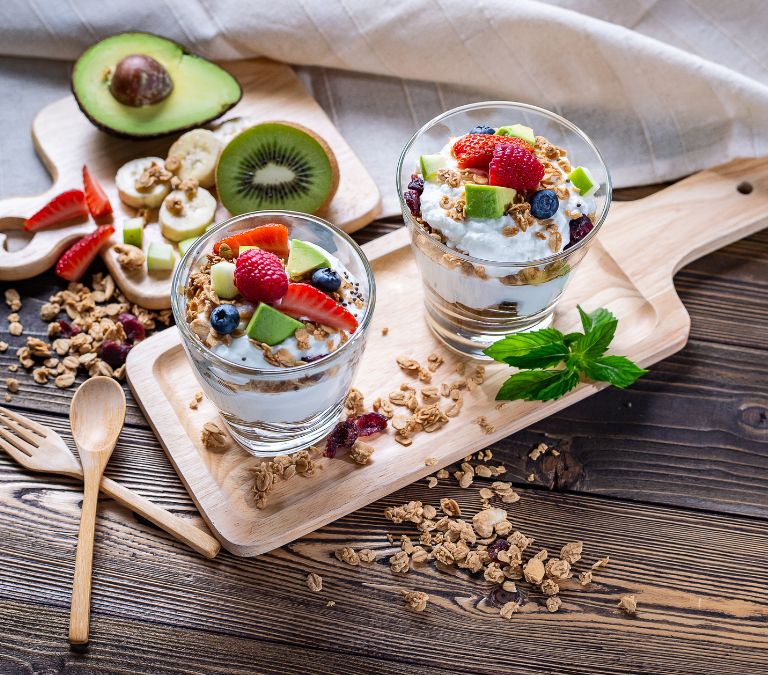
Dairy is not just the go-to meal for calcium. It also serves as a very good source of protein. One of the best sources of dairy protein is Greek yogurt. Greek yogurt is a great way to keep your body’s protein levels in check. They’re high in vitamin D and protein, and they can help you sleep better.
Six ounces give 15 grams of protein, two to three times more than what you would get in your regular yogurt, and more than two ounces of meat or two eggs. Yogurt is also a good source of calcium and vitamin D.
This vitamin-and-mineral combination promotes bone health while also supporting the health of other bodily systems and organs, such as your muscles, heart, and nerves. Probiotics, the beneficial bacteria that support intestinal health, are also present in Greek yogurt.
- Chicken
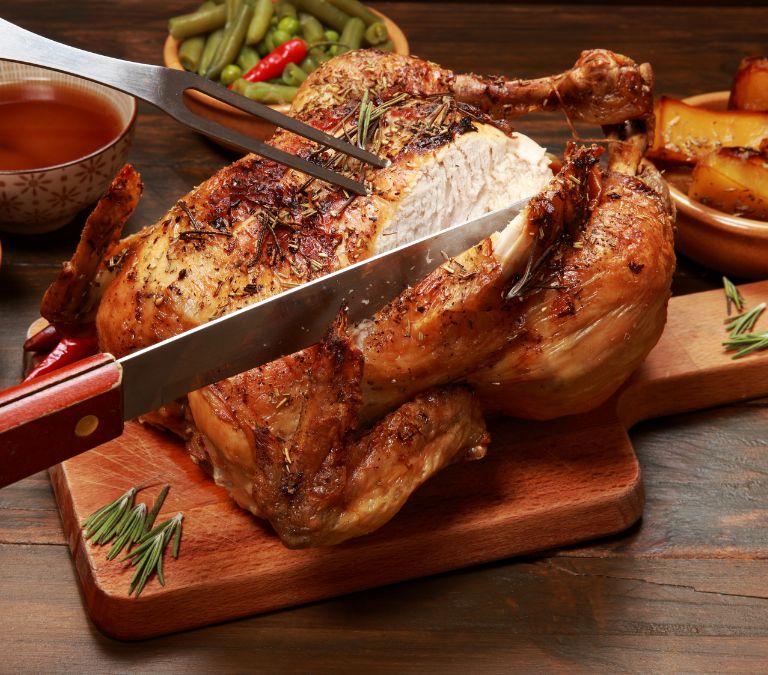
I know we mentioned how we need to place a focus on plant-based proteins, so you might be wondering how chicken cut this list. Well, chicken is an excellent source of lean protein.
Lean proteins are very beneficial because they make you feel fuller for longer. You’ll be less hungry later on and less likely to overeat if you increase your protein intake, which can help you avoid weight gain.
Protein is necessary for maintaining body strength. The loss of estrogen after menopause can result in muscle mass and bone strength loss. Lean protein is one of the macronutrients your body requires to maintain muscle mass, particularly if you’re pursuing a fitness regimen.
When ingested in excess, saturated fat has been related to an increased risk of heart disease, diabetes, high cholesterol, and obesity. Lean proteins like chicken are a good method to increase your protein intake without consuming too much saturated fat.
- Low Processed Soy
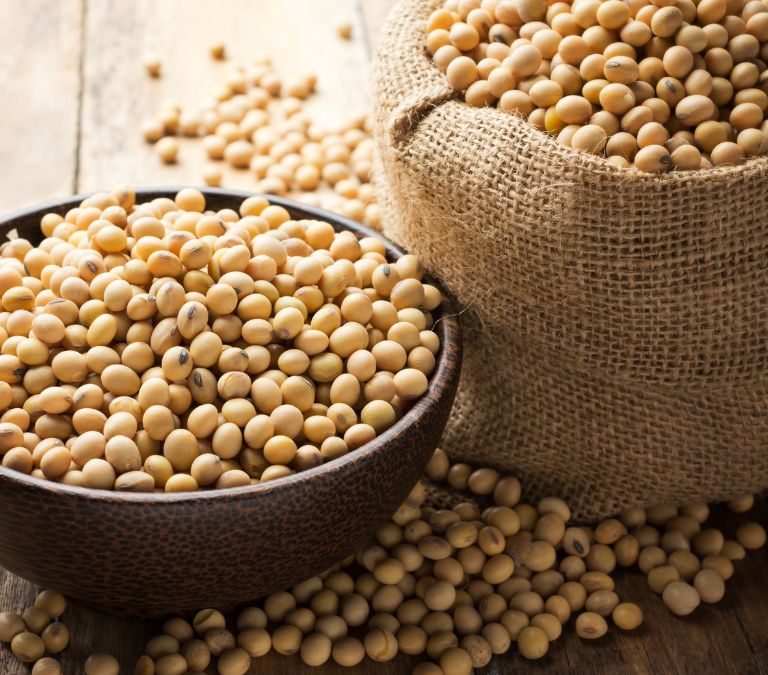
Soy, like egg, is another food substance that has earned a bit of a controversial reputation for itself. Its nutritional benefits are still very much under debate. However, soy is still a valuable part of a menopausal woman’s meal.
Soy is a phytoestrogen, which are plant-based substances that act as weak estrogens in the body and have been associated with fewer symptoms of menopause and stronger bones. Breast Cancer Prevention Partners recommend soy for lowering the risk of breast cancer.
It also provides added protection against tumor cell growth and breast cancer recurrence. Instead of highly processed soy, opt for edamame, tofu, tempeh, and soy-based dairy replacements.
- Beans And Legumes
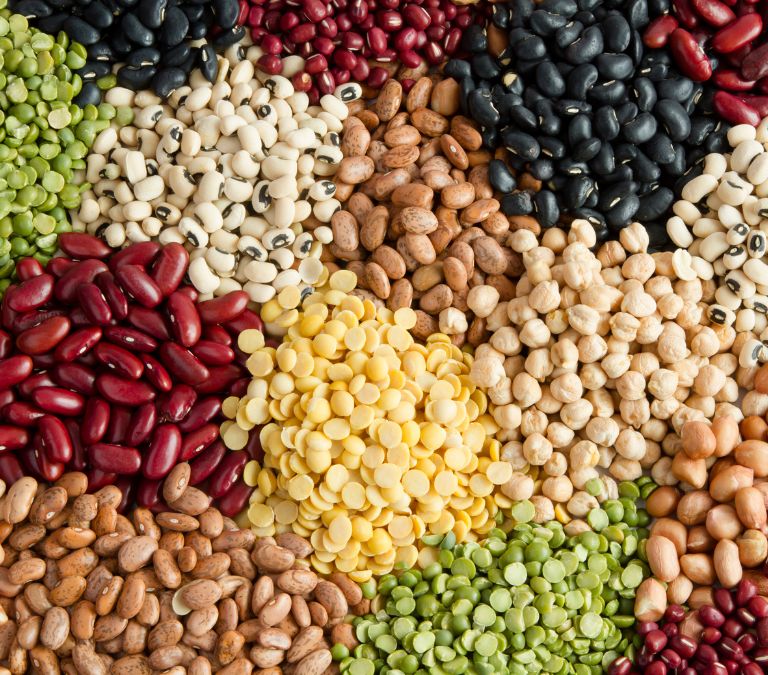
Beans and legumes, which include all forms of dried beans, split peas, and lentils, are good protein sources.
Beans and legumes are nutrient-dense fiber powerhouses that are also high in protein.
Although beans are a rich source of usable calcium and high-quality vegetable protein, they don’t end there. Legumes are also high in potassium and magnesium, which can help with menopause symptoms. Beans have roughly 7 grams of protein per serving (1/2 cup cooked), about the same as 1 ounce of meat. Beans and legumes are also high in fiber, which keeps you fuller for longer. Animal protein sources, on the other hand, contain no fiber. In addition, antioxidants are abundant in beans and legumes.
- Quinoa
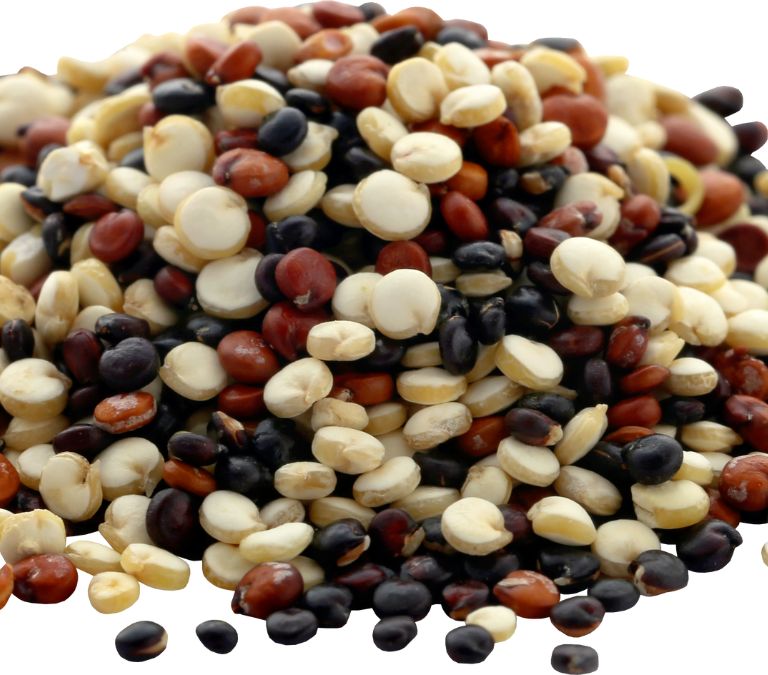
Quinoa is a whole grain, and whole grains form a big part of a healthy diet for women experiencing menopause. Protein, fiber, B vitamins, and magnesium are all present. In addition, it’s a gluten-free grain that’s richer in nutrition than most other grains. Quinoa’s fiber and protein content can help you feel fuller for longer and assist digestion.
And there you have it. We have provided exhaustive information to guide you as you start incorporating protein into your diet. Just because you’re going through menopause doesn’t mean you have to change your food habits. Just follow a few simple guidelines. Menopausal symptoms can be reduced with a well-balanced and healthy diet. You can feel more at ease in your skin by prioritizing nutrient-dense foods and eliminating empty carbs and processed sugars.
Hormone fluctuations can trigger new appetites, leading to the consumption of unhealthy, often sweet, foods that can be addictive. Avoid this at all costs, and take the time to alter your diet so that you can thrive. For the body to function properly, it requires a nutritious diet.
Protein, in particular, appears to be a nutrient that everyone is talking about. It appears to be an essential component of all major diets. Does protein, on the other hand, aid with menopause? What are the finest protein sources for menopausal women, and how does it help? We hope to have answered all the questions you might have regarding this subject. For more specific recommendations consult your healthcare or nutrition professional.

